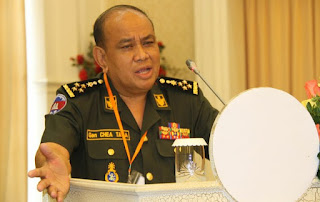 |
| [CPP's thugs armed with sticks blocked border activists to reach their goal, Facebook image] |
By Khmer Wathanakam
www.khmerwathanak.blogspot.com
 |
| [Image Thy Sovantha Facebook] |
The border dispute saga with Vietnam turns into humiliation for all Khmer when Hun Sen turns to his old tactics of using his militias or armed thugs to disrupt and intimidate border activists from visiting border post peacefully, only 100 activists were allowed to reach border post 203 while the rest watched from a distance. This old CPP's dirty tactics had been used in the past when the opposition boycotted the parliament in protesting election fraud, by intimidating and disrupting all opposition's activities throughout the country. We believe that this kind of violent tactics no longer being used by the CPP since the opposition agreed to join the parliament and to create a culture of dialogue with the CPP in order to avert all such violent confrontation. Now the CPP may run out of patient or lose control when the opposition and the people demand transparency on border demarcation with Vietnam thus they return to violent tactic again. So far, though Hun Sen accepts some errors in demarcation, and pledges to borrow original map from UN and other powerful countries-- the US, France, and Great Britain-- there is no sign the government has taken a concrete step to tackle with such a sensitive and critical issue yet. After three day-meeting between the two border committee from the two countries, they have announced a contradicted result: Cambodia claimed Hanoi had made a big concession, agreeing to cease all activities on the white zones and to fill up at least three of eight excavated ponds while Vietnam repeatedly claimed that it has built roads, military outpost, and ponds only in its controlled territories. In fact, Vietnam made no any concession or correction on border dispute, instead it insisted that it had adhered and respected a previous memorandum in 1995. Now over 80 per cent of delineation has been completed, and Hun Sen claimed that he could relocate border posts if found incorrectly based on the constitutional mandated map of 1964. So far, the government has not received the original map yet, Vietnam did not budge to Cambodia's demand, and thousands of Cambodian borders activists were disrupted and not allowed to view border post, only 100 activists were allowed. So the border issue with Vietnam more likely turned bleak; no sign of conceded and compromised tone from Hanoi. How can Hun Sen's government resolve border dispute with Vietnam more effectively when Hun Sen still uses violent tactics to intimidate his own fellow Khmer border activists? This is not a political but a national security issue that the government must heed and protect all those border activists as if Vietnam has done for its own border activists.









